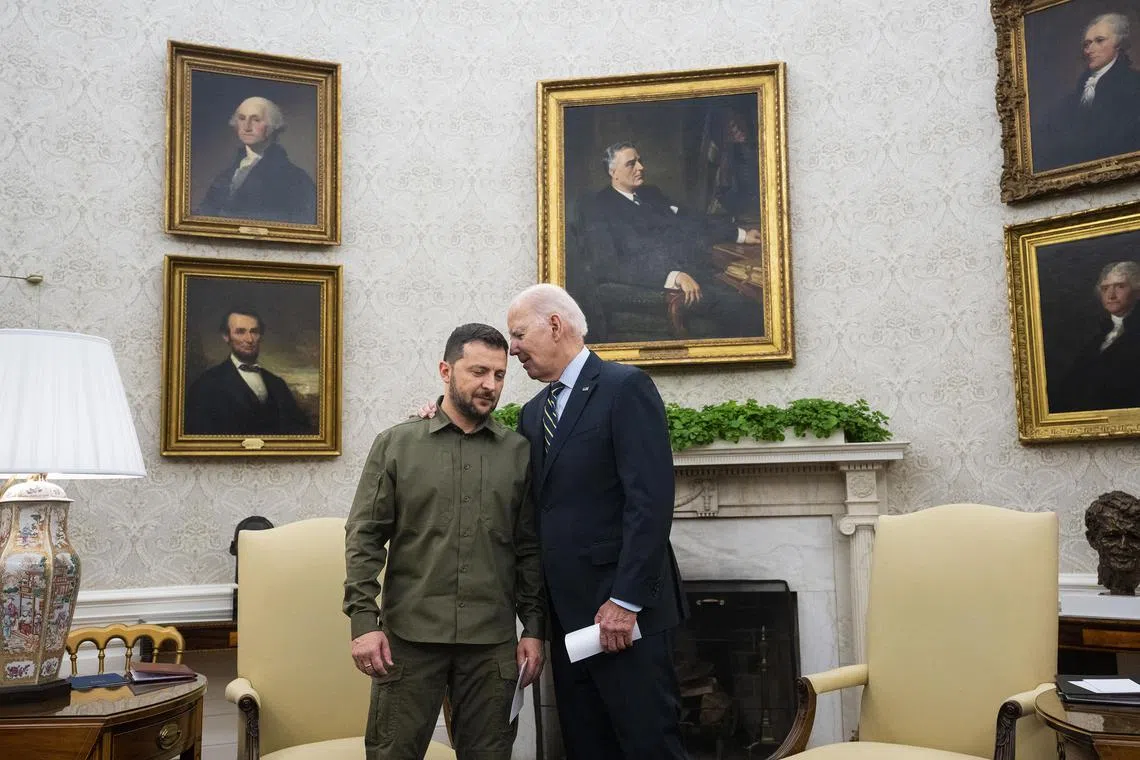Biden to address nation as worries grow about US funding for Ukraine war
Sign up now: Get ST's newsletters delivered to your inbox

Ukrainian President Volodymyr Zelensky (left) and US President Joe Biden meeting in the Oval Office on Sept 21, 2023.
PHOTO: NYTIMES
Follow topic:
WASHINGTON - United States President Joe Biden will soon deliver a major speech to persuade Americans that continued support for Ukraine is in the national interest, amid concerns that funding for the war is fast running out.
“I’m going to make the argument that it is overwhelmingly in the interests of the United States of America that Ukraine succeed,” Mr Biden said on Wednesday.
“I don’t think we should let gamesmanship get in the way of blocking it.”
A small but influential group of Republican hardliners in the House of Representatives is threatening to block any Bill that provides funding for Ukraine, arguing for greater priority for domestic issues such as tackling inflation and the influx of record numbers of illegal immigrants from across the Mexican border.
Among them is Representative Jim Jordan from Ohio, a leading candidate in the ongoing race to replace Mr Kevin McCarthy, who was ousted as Speaker by the right-wingers in his own party on Tuesday.
“The most pressing issue on Americans’ minds is not Ukraine,” Mr Jordan said.
Another strident opponent is Ms Marjorie Taylor Greene from Georgia, who says she will not support any candidate who supports aid to Ukraine. “Not another penny for Ukraine! I will NOT support ANY ONE for Speaker who will send America’s hard-earned tax dollars to the corrupt country of Ukraine!! Defend America’s border!!!” she wrote on X, formerly Twitter, on Wednesday.
In a letter to congressional leaders last week, a Pentagon official warned that the US had only US$1.6 billion (S$2.2 billion) – enough only for urgent battlefield operations – remaining of the US$25.9 billion Congress has provided for replenishing stockpiles sent to Ukraine.
In August, the White House had asked Congress for an additional US$24 billion in military, humanitarian and economic aid for Ukraine. But even in the Senate – where both Republican and Democratic lawmakers support Ukraine – the funding was cut to US$6 billion.
In the House of Representatives, the Republicans flatly opposed it, with then Speaker McCarthy faulting the Senate for ignoring domestic issues and putting “Ukraine in front of America”.
The House left Ukraine funding out of the recent stopgap measure to provide for government expenditure until Nov 17.
Opinion polls show Americans are not as sure of supporting aid for Ukraine as they were when the war began 19 months ago.
Most still support sending additional arms and supplies, but more question whether the investment has been worthwhile.
A new poll by the Chicago Council on Global Affairs, conducted between Sept 7 and 18, showed that some 53 per cent of Americans believe the despatch of US weapons, equipment and training has been worth the cost. Among Democrats, nearly seven in 10 said so, while about six in 10 Republicans disagreed. Independents break evenly on this question.
Another survey by The Washington Post-ABC, conducted between Sept 15 and 20, asked if the US was giving too much or too little assistance to Ukraine. It found most saying that it was the right amount although, again, the Republicans said it was too much.
Mr John Herbst, a former US ambassador to Ukraine, said a fall in public support for Ukraine funding arose from the fact that an end to the war was not in sight. The White House has also not made a compelling case that while this was not an American war, it was a war that greatly affects American interests.
Americans, he pointed out, have no reservations about the country’s large defence budget.
“But the assistance we provide Ukraine is seen as a gift to Ukraine, not an investment in American security,” said Mr Herbst, senior director of the Atlantic Council’s Eurasia Centre.
“At the beginning of the Russian invasion and the revelation of war crimes, people were horrified and responded to that. But the White House has not made the case that Russia’s foreign policy is aggressive against the US and that a Putin win in Ukraine will be a prelude to further Russian aggression in Europe – that, therefore, there’s a vital American interest in ensuring Putin’s defeat.”
Linking aid for Ukraine to other issues was a false premise, he said.
“This is a cynical gambit. I understand why many Americans, not just Republicans but a lot of independents, think what’s happening at the border is dangerous to American interests and needs to be reversed. But the populists in the Republican Party, who don’t understand America’s vital interests in a stable Europe, have linked these two issues artificially.
“In other words, the US government can both secure the border and protect American interests by providing assistance to Ukraine. These things are not in conflict,” Mr Herbst said.


